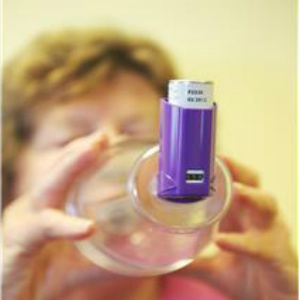GPs set to take half a million COPD patients off steroid inhalers

GPs are being urged to review all their patients with COPD who are taking inhaled steroids in light of new treatment guidelines, with UK experts estimating that as many as half a million patients who are currently prescribed the inhalers should be taken off them.
Under the new guidelines, from the international Global Initiative for Chronic Obstructive Lung Disease (GOLD) network, GPs should avoid starting patients on inhaled corticosteroid (ICS) therapy unless they have ongoing exacerbations that cannot be controlled with long-acting bronchodilator medications.
This marks a significant shift from previous guidelines, including the NICE guidance on COPD, which advise use of ICS inhalers at an earlier stage, and simply on the basis of poor lung function, experts said.
GOLD board member Professor David Halpin, a consultant respiratory physician at the Royal Devon and Exeter Hospital and former chair of the NICE COPD guidelines, told Pulse this means GPs should review patients at the next opportunity – and that as many as half a million currently on ICS therapy should come off the inhalers.
Professor Halpin said: ‘Studies have shown that up to 40% of patients with COPD are over-treated with ICS, and given the total number of people with COPD a figure of half a million over-treated is a reasonable estimate.’
The changes in treatment recommendations come after publication of a raft of studies finding ICS therapy is less effective and more harmful than previously thought, with side effects such as pneumonia outweighing any benefit for many patients.
GPs in some areas have already come under pressure to take patients off steroids under local cost-cutting measures, but Professor Halpin said these had made only a small impact so far and that GPs should start following the latest GOLD advice because the NICE guidance is now seven years out of date. NICE is currently in the process of updating its recommendations but it is thought the final guidelines will not be available until 2018.
Professor Halpin said: ‘It could potentially be confusing for GPs, but the last NICE update was published in 2010 based on 2009 evidence – that is now seven years out of date, and there have been a lot more studies, so until more up to date NICE guidance is available really people should be looking at the more contemporary guidance.’
He added: ‘At the annual review it would be worth identifying people on inhaled steroids, looking at their exacerbation history and deciding whether there is an indication to continue them and if there isn’t, consider withdrawing it in a controlled manner.’
However, GP respiratory experts cautioned that the decision to stop steroid therapy requires very careful assessment – in particular to check for overlapping asthma.
Dr Mark Levy, GPSI in respiratory medicine in North West London, said that while he agreed that the GOLD approach reflected the best evidence-based approach, ‘there should be a “health warning” with reducing or stopping inhaled steroids, making 100% sure the person doesn’t have mixed disease with asthma before doing so’.
There are also concerns that GPs still do not have adequate access to the key non-pharmacological alternatives of pulmonary rehabilitation and stop smoking support.
Dr Noel Baxter, chair of the Primary Care Respiratory Society, said the new advice ‘reflects a direction of travel that has been present for a few years now in the UK’ but warned the GOLD guidance ‘is a very long’ and ‘most GPs won’t have time to digest it’.
Dr Baxter said: ‘Locally I would hope COPD interested respiratory specialists and generalists will come together to make a concise and GP relevant guideline using what we now have from GOLD/NICE and our UK respiratory societies.’
Pulse October survey
Take our July 2025 survey to potentially win £1.000 worth of tokens

Visit Pulse Reference for details on 140 symptoms, including easily searchable symptoms and categories, offering you a free platform to check symptoms and receive potential diagnoses during consultations.










